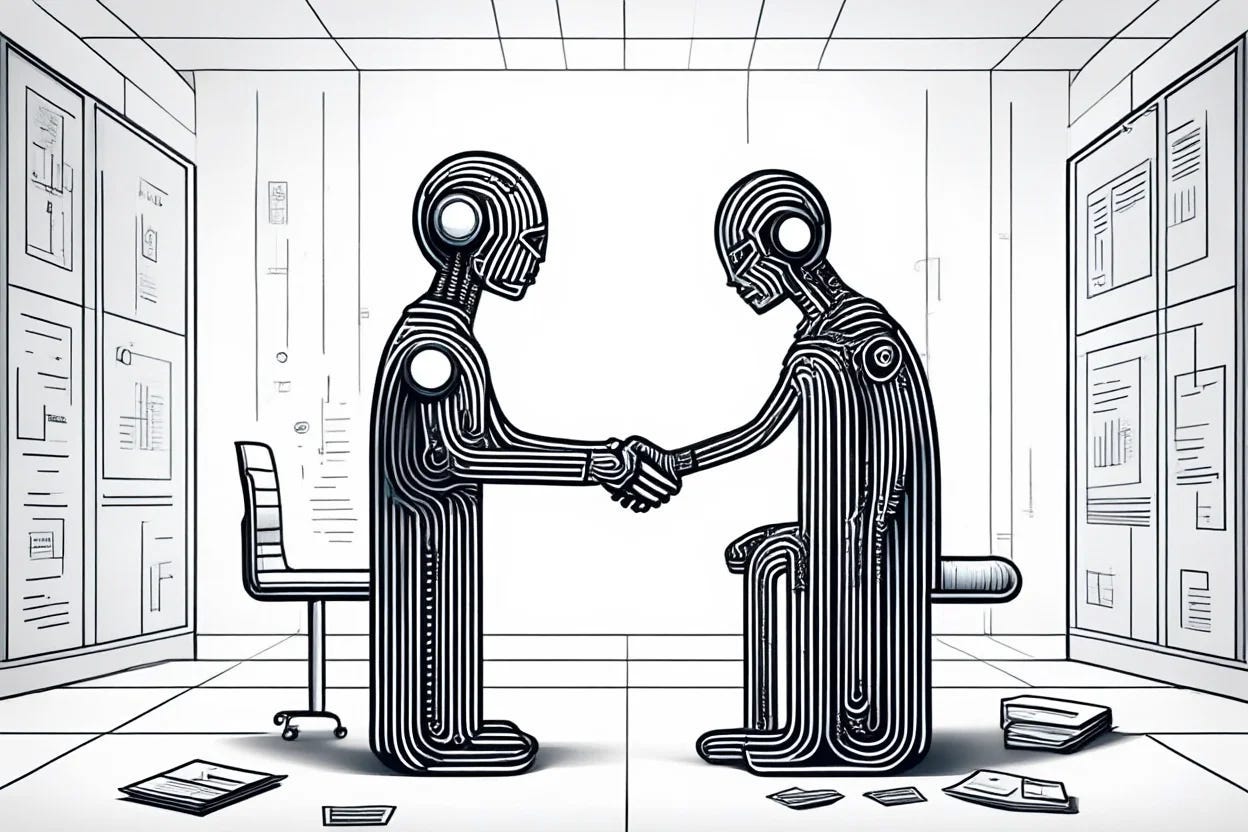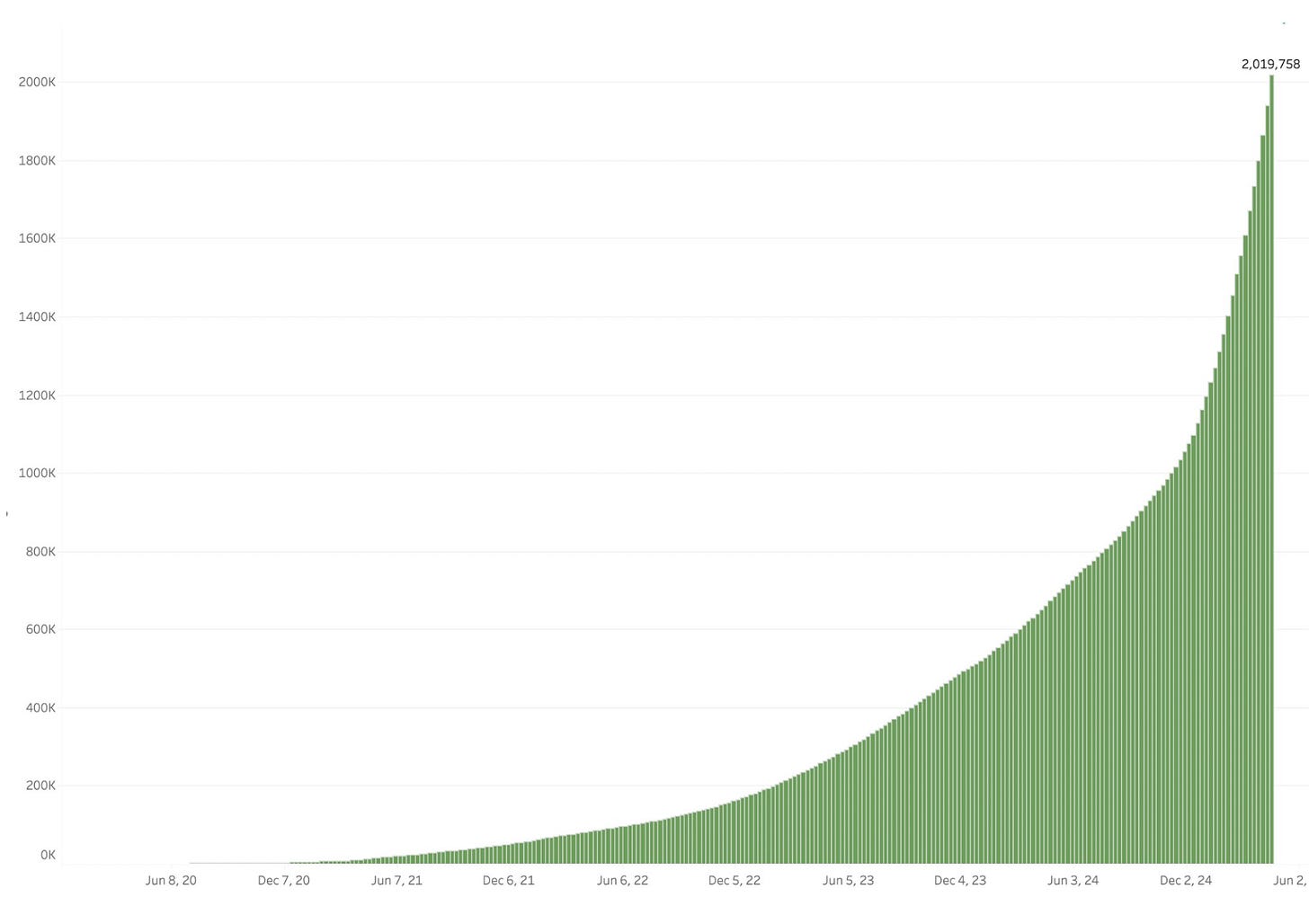When Software Buys Software
Software was built for humans. Now it’s being chosen by machines.
It’s now obvious to most builders and investors that AI Agents are the new platform shift.
We’re in the early innings and seeing major breakthroughs in reasoning and chain- of- thought (CoT) everyday.
Frameworks like LangChain are driving rapid agent development, while software giants like Anthropic and Google are explicitly exploring agent-to-agent (A2A) communication paradigms.
From my vantage point as an investor, what’s most fascinating is how agents are beginning to operate with real autonomy. They aren’t just copilots anymore—they’re becoming decision-makers, even in enterprise software procurement.
Agents selling software to other agents sounds dystopian, but it’s not far off.
The traditional B2B sales cycle—built around human relationships, months-long funnels, and enterprise steak dinners—will give way to A2A transactions, where procurement is algorithmic, fast, and deeply rational.
We’re already seeing glimpses of this future.
Companies like Replit, Lovable, Bolt, and V0 have strong opinions about the infrastructure best suited for AI-driven applications. But the next step is agents deciding on that infrastructure without any human involvement. They’ll pick the tools that solve the problem fastest, cheapest, and most securely—no procurement team required.
Chapter One portfolio company Supabase is a perfect case study.
Just yesterday at Figma Config—now arguably the design conference of the year—Figma announced Figma Sites, with Supabase as the default backend.
In just over three years, Supabase has gone from open-source Firebase alternative to the database of choice for over 2 million developers. But more importantly, it’s begun winning embedded integrations inside app-building platforms. That’s a new level of distribution.
Look at the insane Supabase growth chart over the last 6 months as they’ve reached 2m developers:
Now imagine when infrastructure decisions—like picking a database—are automated by agents.
Supabase isn’t just the human choice. What happens when it becomes the agent’s choice, too?
That’s what makes the Supabase growth chart so interesting.
It doesn’t just show developer adoption. It marks the decline of enterprise sales theater.
For the last 15 years, software buying has been shaped by steak dinners, Warriors suite invites, and Napa boondoggles. Fun? Sure. But efficient? Not at all.
That world is fading.
Software procurement is becoming algorithmic, precise, and refreshingly impersonal. The best product wins, not the best schmooze.
My friend Tomasz Tunguz (Theory Ventures) captured this shift perfectly this week:
If I ask an AI agent to create a web application, I want it to select all the components : the front end framework, the database, & the hosting service. I just want the website to work.
The agent won’t pause to ask, “Do you have a preferred vendor?” busy reasoning about the task at hand, it will continue on its code path, hurtling towards an answer
It’s tempting to assume agents will optimize purely for performance-to-price—like today’s cloud pricing wars. But it’ll be far more complex.
These decisions will hinge on model compatibility, explainable actions, regulatory compliance, and privacy guarantees.
Securing these interactions—especially when proprietary algorithms or sensitive datasets are involved—will drive real innovation in applied cryptography.
Expect zero-knowledge proofs and blockchains to move from niche crypto tools to essential infrastructure for trust, verifiable identity, and seamless value exchange in an agent-powered world.
Take CRM, for example.
If you were building an agent-first CRM today, it wouldn’t resemble anything we use now. It would be designed from the ground up for machine-to-machine interactions.
The APIs would be lightning fast. No UI overhead. No human latency. Just clean, efficient data exchange.
It would integrate natively with major AI ecosystems so agents could coordinate across teams and platforms.
Analytics would be built not for dashboards, but for agents to evaluate and improve their own performance.
Compliance wouldn’t be manual. It would be encoded in the system so agents could self-regulate based on pre-defined policy.
Pricing would be dynamic and negotiated in real-time between agents.
This is what it means to stop building for human operators, and start building for agents.
Many assume AI’s economic upside will be captured by a handful of tech giants.
But if you’ve worked inside a place like Google, you know how innovation gets buried—under legacy code, bloated org charts, and teams too far from the frontier.
As Tom said: “AI will be the Chief Procurement Officer.”
Software won’t be sold over drinks. It’ll be selected, evaluated, and integrated by agents.
Most incumbents won’t adapt fast enough.
That’s the opportunity for founders and investors who see what’s coming.
If you’ve got product instincts, this is the most exciting moment in startup history to build.








Sincere futurism that celebrates agents selling software to agents without stopping to ask what’s being displaced—or who—is just the latest expression of a deeper pathology in tech: a drive to build humans out of their own systems in the name of efficiency.
We’ve seen this before. Every time technology is framed as “inevitable,” what follows is a series of decisions made by a shrinking number of players with massive influence, hiding extractive motives behind sleek language and noble-sounding goals.
When big tech engineers systems where agents handle procurement, negotiate pricing, and enforce compliance—without human context or friction—it isn’t just an evolution of business. It’s a quiet erasure of judgment, nuance, and economic participation for millions of people.
The pitch is always speed, objectivity, optimization. But optimization for what? For whom? Replacing flawed human sales cycles with “rational” AI pipelines just re-centralizes power—this time in the hands of those who own the agents, the APIs, the data, and the infrastructure underneath.
And calling that the “end of enterprise sales theater” is clever, but it obscures a more important truth: when people lose the ability to influence systems through relationships, conversations, and even schmoozing, they don’t get more efficient—they get excluded.
The real danger isn’t that agents will pick the fastest or cheapest tool. It’s that a tiny circle of dominant actors will train the agents, define the logic, and lock others out of the loop entirely.
This isn’t the future of software. It’s a future of economic enclosure dressed up as progress.
Jeff, I enjoyed this. Hope you are well. Thought you might enjoy these related comments by my brother Tim at a recent conference: https://t.co/Jm04A8U6Rl